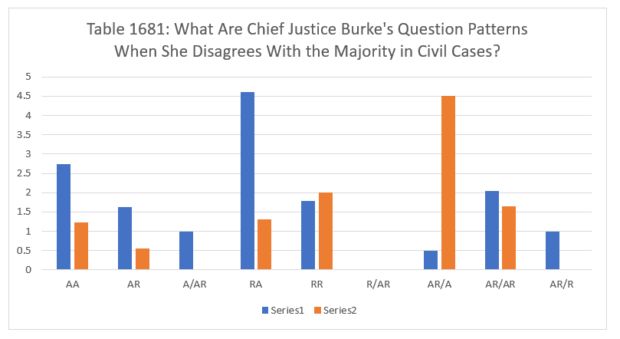For the past few weeks, we've been reviewing the oral argument data on individual Justices, trying to determine whether it's possible to predict from the analytics whether a particular Justice is likely to dissent. This week, we're looking at the numbers for Chief Justice Burke.
When the Chief Justice is in the majority, we see the expected patterns. In an affirmance, she averages 2.74 questions to appellants and 1.24 to appellees. In a reversal, she averages two questions to appellees and 1.78 to respondents. When she joins the majority in a split result ("affirmed in part, reversed in part"), she averages 2.05 questions to appellants and 1.64 to appellees.
When the Chief Justice dissents in a civil case, the results are clear – she more heavily questions the appellant regardless of her own views of the case. When the majority affirms but she votes to reverse, she averages 1.64 questions to appellants, 0.55 to appellees. When the majority reverses but she votes to affirm, she averages 4.6 to appellants, 1.3 to appellees.
As always, the data on split results is scant. But when the majority affirms but the Chief Justice wants a split result, she averages one question to appellants and none to appellees. When the majority returns a split result but the Chief wants to reverse outright, same thing – one questions to appellants, none to appellees. And when the majority decides on a split result but the Chief Justice wants to affirm outright, she averages 4.5 questions to appellees and only 0.5 to appellants.

Join us back here next time as we review the data for the Chief Justice's criminal cases.
Image courtesy of Flickr by denisbin (no changes).
The content of this article is intended to provide a general guide to the subject matter. Specialist advice should be sought about your specific circumstances.
